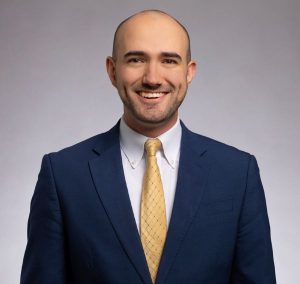For new law grads weighing job offers and future cities, salary alone doesn’t tell the full story.
While major markets like New York, Boston, Los Angeles and Washington, D.C. offer some of the highest law firm salaries in the nation, they’re also among the most expensive places to live.
When adjusted for cost of living, these iconic cities slide down the rankings of the best places for new lawyers to live and work.
The real winners — at least financially — are cities that strike the right balance between compensation and affordability.
To identify the top cities for law firm jobs, we used mean salary data from the National Association for Law Placement’s Class of 2023 report and adjusted it for cost-of-living differences across the country.
Texas took the top three spots. Houston, Austin and Dallas offer the highest average law firm salaries in the country once expenses like housing, groceries, transportation and health care are factored in.
That’s no surprise to Houston attorney Tyler Brewster.
“I didn’t graduate at the top of my class at University of Houston Law Center in 2024,” he said, “but I’m making really good money, and I think I owe that to the market I’m in.”
Brewster works at a midsize litigation firm, with his practice focused on managed care litigation. He said Houston delivers a strong mix of financial stability, job diversity and professional community.
“We have one of the busiest federal dockets in the country and two powerhouse industries in energy and health care,” he said. “And we have a relatively low cost of living for a city of this size.”
While Houston leads overall, the data also highlights the best places depending on firm size.
For grads targeting BigLaw (firms with more than 101 lawyers), Texas cities again dominate. For smaller firms (26 to 50 attorneys), Houston remains No. 1, joined by Minneapolis-St. Paul and Washington, D.C. For midsize firms (51 to 100), the top cities are Minneapolis-St. Paul, Washington, D.C. and Houston.
The takeaway? The best cities for new grads aren’t always the flashiest — they’re places where salaries stretch further, debt becomes more manageable, and young lawyers can build careers without sacrificing lifestyle.
Law Firm Salaries by City
Houston tops the list
Brewster’s experience in Houston, the fourth-largest city in the U.S., has exceeded his expectations.
“A lot of it comes down to state income tax,” Brewster said. “Texas doesn’t have [income tax], and the cost of living is lower compared to other segments of the country. That combination makes a huge difference.”

Brewster, an associate at McDowell Hetherington LLP, earned his undergraduate degree at West Virginia University and had planned to attend law school there.
But plans changed after meeting his wife while they were both working on Capitol Hill.
The decision to move to Texas centered on being near her family in Houston, Brewster said.
“The cost of living based on an attorney salary is more than workable here, especially if you’re smart with your money in the first few years,” he said. He and his wife were able to buy a home shortly after graduation.
That early stability, he said, makes student loan debt more manageable.
“Law school debt makes it a little less workable, but that’s just the cost of doing business,” he said. “You can still build a good life here.”
Brewster didn’t always plan to become a lawyer. After graduating from West Virginia University, he worked on Capitol Hill as the “body man” for U.S. Sen. Joe Manchin. The experience sparked his legal interest.
“It struck me how fast these massive pieces of legislation move,” he said. “I remember thinking, ‘There are going to be a lot of disputes over this,’ and that’s when I started seriously considering law school.”
Now, Brewster urges law students and new grads to be strategic.
“Think about what kind of law you want to practice and where those jobs actually exist,” he said. “Analyze salaries, hiring trends and cost of living. There’s a lot of data available; use it to make wise decisions.”
He also urges young lawyers to think long-term.
“You want to be in a place that supports your career and lifestyle,” Brewster said. “That means affordable housing, reasonable commutes and a strong community.”
Lifestyle matters
Tiffany Tucker, assistant dean for career development at UHLC, agrees. She sees firsthand how lifestyle factors weigh in job decisions.

For her, Houston is a city where lawyers can thrive both personally and professionally.
“Choosing where to practice law involves more than following a salary chart or chasing prestige,” Tucker said. “It’s about aligning financial goals with lifestyle needs, personal identity and long-term well-being.”
She said Houston consistently ranks high for young lawyers when salary is measured against cost of living.
“The American Bar Association employment summary gives just the numbers, but we go deeper,” she said. “At UHLC, we teach students how to negotiate salary, and I truly believe that’s one reason our grads outperform national averages in their first year of practice.”
At UHLC, students are also taught to consider non-salary benefits like bar dues, CLE credits and health coverage.
“If your firm is paying your bar dues and your CLEs, that’s money in your pocket,” Tucker said.
One of Houston’s greatest strengths is its diversity — in its people and its legal practice areas, Tucker said.
“There’s so much variety in practice areas here. You can do almost anything,” she said. “Whether it’s energy law, health care, intellectual property or immigration, Houston is a city where specialization doesn’t limit opportunity.”
That diversity extends beyond the courtroom, Tucker said. From eclectic neighborhoods to an underground cultural scene, Houston provides a quality of life that’s hard to match.
Tucker, who previously practiced in New York City, said she’s living better in Houston.
“No income tax and lower expenses go a long way,” she said.
When advising students, she encourages them to shift their mindset from student to working professional.
That means asking real, grounded questions: What salary do I need to meet my basic living expenses and student loans? What are my geographical, social and professional deal breakers?
And just as important: emotional fit.
“Be where you can be authentically yourself and feel comfortable,” she said. “That’s not something you can always quantify, but it matters.”
Law in the Twin Cities
When Sean Smallwood made the move from his home state of Texas to Vermont to pursue a master’s degree in higher education and student affairs, he couldn’t have predicted that a few years later, he’d be building a successful legal career in the heart of the Midwest.

“As soon as I came to Minnesota, I loved it,” Smallwood said. “I liked how it was in a city, especially Minneapolis and Saint Paul, but it wasn’t so overwhelming like places on the East Coast.”
Smallwood’s path to law school began when he moved to Minnesota from Vermont for a job at the University of Minnesota.
Just as in Vermont, he found that Minnesota offered access to nature alongside city life.
“My partner and I live near a lake, and we go running or biking around it at least once a week,” he said. “It’s great for our mental health.”
Smallwood’s partner and his partner’s family are from Minnesota. This played a major role in his decision to attend University of St. Thomas School of Law-Minneapolis, graduating magna cum laude in 2023.
During law school, he took advantage of experiential learning opportunities, working as a judicial extern to the Honorable Christian Sande of Hennepin County Court and as a summer associate at Taft.
Smallwood, now an associate at Taft Stettinius & Hollister LLP’s Minneapolis office, said Minnesota’s legal community has a professional culture that is unusually collegial and collaborative.
“Even though our profession can be adversarial, and the job is hard, I’ve had great experiences with opposing counsel and with colleagues,” said Smallwood, who focuses on employment and labor relations law. “There’s an understanding that our jobs are difficult, and we don’t need to make it harder for each other.”
Minneapolis also offers cultural perks and affordability.
“My partner and I have a running list of restaurants and breweries to try, and we can’t keep up,” he said. “When friends visit from New York or Boston or Chicago, they’re always surprised at how many great spots we have to take them to.”
The cost of living, combined with strong scholarships from Minnesota’s law schools, helped him graduate with less debt than peers in other cities.
While Minneapolis itself can be pricier than the suburbs, Smallwood said he feels that his quality of life is high even as a young associate.
“For me, it’s not just where I practice law,” he said. “It’s where life works.”
Hot hub insights
As the legal job market continues to evolve, new graduates are weighing more than just salary and prestige.
Today, factors like cost of living, firm culture, industry presence and long-term growth potential are all shaping where young attorneys decide to start their careers.
According to Jamy Sullivan, executive director of talent solutions and business consulting firm Robert Half’s legal practice group, some cities are standing out more than ever. Here’s what’s hot right now and why.
Texas on top: Houston, Dallas, Austin
In crunching the numbers on median salary and cost of living, three Texas cities rose to the top as the hottest hubs: Houston, Dallas and Austin.
“Dallas is very diverse and open to newcomers,” Sullivan said, noting that many firms have opened new offices there in recent years.
Austin brings a different flavor to the table.
“It’s starting to feel like a smaller version of the Bay Area,” Sullivan said, pointing to the city’s growing tech sector and influx of startup culture. “All three cities are benefiting from the corporate migration to Texas, making them prime locations for recent grads looking for opportunity and upward mobility.”
Minneapolis: Underrated, but promising
Minneapolis may not always be top of mind, but Sullivan said it is “a great hub” for young lawyers. Between the Twin Cities, the area is packed with boutique and midsize firms and offers a strong balance of professional growth and quality of life.
“There’s a great trajectory here, and it’s a good blend of suburb living and city living,” she said. “The legal scene includes a healthy client base, thanks to the many corporations headquartered in the area.”
East Coast appeal: Washington, D.C. and Boston
Washington, D.C. has long been a hotbed for attorneys, and that hasn’t changed, Sullivan said.
“Law firms are still hiring here,” she said, adding that the area continues to be a destination for those interested in regulatory work, government and policy.
Sullivan said Boston is another strong contender as it offers proximity to the fast-paced East Coast legal world without the saturation of New York.
“You get that flavor of East Coast business, but with slightly more balance,” Sullivan said.

—Jamy Sullivan, executive director, Robert Half
California: High costs, high rewards
Despite its sky-high cost of living, California is still in demand, especially Los Angeles and San Francisco.
“We’re seeing demand for new grads in LA and the Bay Area at an all-time high,” Sullivan said. “Law firms there are willing to train and invest in associate attorneys, and strong starting salaries help offset living expenses.”
Even with its steep price tag, the Bay Area remains a magnet for tech-minded lawyers.
“Proof that California is still a legal launchpad, look no further than University of California, Berkeley, School of Law’s Class of 2024, which boasted 99% employment, with 64% entering law firms,” Sullivan said.
Chicago and the suburban blend
Chicago remains a consistent performer in the legal landscape.
“It offers both the big-city feel and the option for suburban living,” Sullivan said. “The city’s central role in the Midwest makes it a hub for firms serving clients across Illinois and beyond.”
With major corporations based in Chicago, Sullivan said it’s also a smart move for those considering a transition to in-house roles later in their careers.
Miami: Market with a twist
Miami may rank lower (No. 21 on the list), but it has its own distinct appeal, especially with its low cost of living. However, Sullivan said it can be “a little harder to be a transplant” because of one key requirement: bilingualism. Spanish fluency is often a must, given the city’s unique demographic and client base.
More than just a zip code
Ultimately, choosing where to launch your legal career isn’t just about today, Sullivan said, it’s about where you want to be in five, 10 or 20 years.
“Whether it’s big city life or a steppingstone to corporate work, think about your long-term goals,” she said. “Where you start can shape the trajectory of your legal career.”

